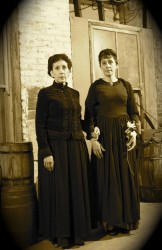Nineteenth Century Naturalism Complete with Consumption
Although Edith Wharton is not generally known for writing about poor New Yorkers, her story The Bunner Sisters, adapted for the stage by Julie Beckman of the Athena Theatre Project, focuses on the lives of two lower-middle class Protestant spinsters, (of the haute Clavinist bent) struggling to stay afloat in New York City in the late 19th Century.
Written at a time when the Naturalist literary movement, exemplified by the French writer Emile Zola, was in vogue, The Bunner Sisters conforms to many of the Naturalist precepts, but is tamer, although no less depressing than Zola’s novels.
Two very frugal sisters run a not very successful sewing alterations and “bonnet” shop in a run-down part of New York, where they may not have a lot of money but are emotionally sustained by a close, tight-knit neighborhood. Their lives change when the elder sister, Ann Eliza Bunner, played by Marty Mukhalian, meets a man whose loneliness and supposed difficulties appeal to her rescuing instincts.
Although things look promising when he marries the younger sister Evelina Bunner, played by Annette Toutonghi, eventually, his character flaws, social conditions, poverty and misery take over and nobody lives happily ever after in typical 19th Century fashion. Like a Pucci opera or a Dostoevsky novel, consumption eventually rears its head.
Although many great works of prose do well as stage adaptations, The Bunner Sisters was not one of them. Not only was the story extremely depressing, the two lead actresses lacked energy. Vocally, they sounded like depressed people and delivered their lines with a dull affect, so the audience’s interest was not engaged. As written, the story is not very dramatic, there is no protagonist pursing a goal, the two sisters just wait for things to happen to them, which makes for a good read, but not for good theatre., especially when it is over two hours long.
One of Seattle’s comic genius’, Megan Ahiers, as Miss Mellins, a gossipy but compassionate neighbor, provided the only comic relief of the evening and had the energy, vocal ability and clear diction, which the leads lacked, to make the audience pay attention. As Edith Wharton, who supplied the narration and was an occasional customer at the shop, Marianna de Fazio, looked every inch the patrician New Yorker, spoke with a rich honey drenched voice and was a delight to listen to.
As a script for a screen play, I would say it had an excellent chance to be produced by a Merchant/Ivory type team; however, the stage was extremely crowded with several different “mini-sets” on too small a space. The furniture and clutter of the set meant that the actors could not move around easily; slowing everything down and creating awkwardness. Less would have been more. In addition, the scenes played on the floor were not visible from the back row. It was a pity to waste what was otherwise an extremely interesting set, along with some excellent power point scenes of old New York, on a stage where it just created visual over-stimulation.
I enjoy Chamber Theatre, that is to say, staging prose works complete with 3rd person narration, and incorporating the actual author Edith Wharton into the story worked well, however, the pessimistic nature of the subject matter and the lifelessness of the two leads were not the best combination. However, I look forward to more productions from this company, they clearly have some talented, well-read performers who, if they choose a more stage-able story, are capable of something first rate.
The Bunner Sisters, Athena Theatre Project and Theatre off Jackson. 409-7th Ave S, International District Seattle, Wed-Sat 8:00 pm. Sept. 28 and Oct 5 at 2:00 pm. Closes 5 pm. Tickets: www.thebunnersisters.brownpapertickets.com Info: athenatheatreproject.org

















